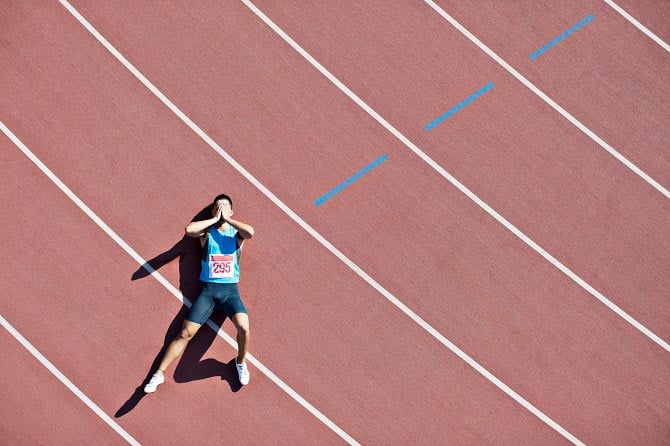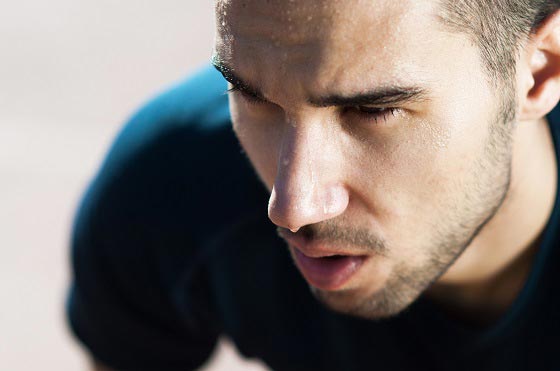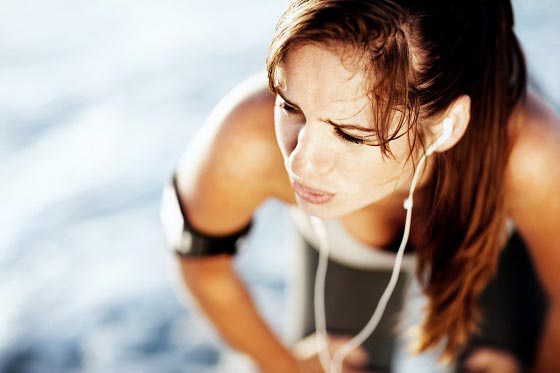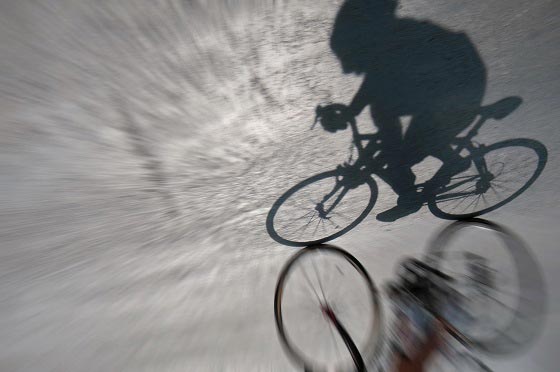Overtraining: Causes, Symptoms & Treatment
The sport scientists Prof. Lars Donath and Dr. Oliver Faude tell you all you need to know.

Exhausted, tired, or just beat up: this is how athletes who are affected by overtraining feel. We asked Prof. Lars Donath from the German Sports University Cologne (DSHS) and Dr. Oliver Faude from the University of Basel what is meant by overtraining, how you can recognise it and how you can avoid overtraining altogether.
Overtraining: The Basics
Suddenly, your performance has taken a nose dive: You've given your all the last training sessions. But instead of getting faster, stronger, you lose your edge and just feel tired all the time. Often the term "overtraining" is used in such situations.
But what exactly does "overtraining" or "overtraining syndrome" mean?
Definition: What is overtraining?
From the point of view of sports medicine, overtraining is a reaction to chronic stress overload that can occur when athletes train too intensively and/or too frequently and/or do not maintain sufficient regeneration phases between training sessions. The overtraining syndrome manifests itself in a performance drop of the athlete, "which is still detectable even after a prolonged regeneration phase", as the training scientists explain. When overtraining occurs, the subject experiences subjective symptoms, for which there is no objective cause.
By the way: While laymen talk about "overtraining," this is not quite correct from a sports medicine point of view: The definition "overtraining syndrome" Dr. Faude uses is clearer: "Overtraining refers to a process. Overtraining is sometimes deliberately used for a limited period of time in order to cause training adjustments (e.g. in intensive training camps). If this is followed by a sufficient regeneration phase, the body will recover and the athlete will reach a higher performance level. If overtraining lasts too long or the regeneration phases in between are insufficient, then there is a danger of overtraining."
When does overtraining typically occur?
It is difficult to say which sports are particularly susceptible to overtraining according to Oliver Faude and Lars Donath: "Endurance sports are probably more at risk, but overtraining syndrome also occurs in (fast-) strength sports."
Particularly critical are anaerobic loads such as tempo runs, chronically intensive endurance training and a schedule filed with too many competitive runs.
"Often the training sessions between the individual stress stimuli, which were actually planned as regeneration, are too intensive or too long. Or the regeneration in the week after training camps is too short," the experts say. "Constant monotonous training is also problematic in comparison to training that consciously uses high stimulus peaks in alternation with consistent recovery."

Consequences of overtraining: How the body reacts
But what actually happens in the body when athletes train too much or too intensively? Lars Donath and Oliver Faude explain: "The chronic release of a stress hormone can lead to a counter-regulatory response of the stress-regulating systems, essentially the Hypothalamic–pituitary–adrenal axis. This in turn has an influence on hormonal and immunological regulation, on the cardiovascular system, the metabolism and on the central nervous system as well as the Autonomous Nervous System".
"Simply put, for its own protection, the body impaires itself so that it cannot strain itself so heavily again. Attaining maximum performance becomes more difficult and one becomes tired more easily and earlier. The pathophysiology behind the overtraining syndrome is similar to that of burn-out and other stress syndromes."
A further consequence "of a catabolic metabolic state can be an increase of protein degradation", explains Oliver Faude. Whether a correlation exists between overtraining and weight gain: "The science is inconclusive."

Symptoms Of Overtraining
These are some typical symptoms of overtraining:
- pain (generally, in the legs, muscles or joints, headaches)
- fatigue, exhaustion, lack of energy, weakness
- insomnia
- inability to relax, increased nervousness, restlessness
- low endurance
- elevated blood pressure
- weak immune system
- Frequent injuries
- Hormonal disorders: Over-production of cortisol and too little testosterone
- For women: Change in menstrual cycle
Simply tired or suffering from overtraining?
Oliver Faude and Lars Donath explain that the transition from acute fatigue to overtraining is a fluid one: "There is a fluid transition from acute fatigue after an intense training session to prolonged fatigue (for example, after an intense training camp) to overtraining syndrome."
In connection with overtraining the term "overreaching" is often used. Here you have to distinguish between functional overreaching and non-functional overreaching, says Oliver Faude.
"If overtraining syndrome has occurred, then it is usually too late", explain Lars Donath and Oliver Faude.

Consequences and treatment of overtraining
The immediate consequence of overtraining is "a long-term break, usually the end of the season", the scientists said. In high-performance sports, repeated overtraining could also mean the end of a career.
If you suspect that you have been affected by overtraining, you should consult a sports physician.
However, figuring out you are suffering from overtraining syndrome is not easy: "At the moment there is no single clinical marker that can reliably point to overtraining syndrome as the culprit."
Whether an athlete suffers from overtraining syndrome can only be determined by excluding other (medical) factors: "The overtraining syndrome diagnosis is a clinical exclusion diagnosis, i.e. there must be no other explanation (e.g. chronic infections, iron deficiency, metabolic diseases) that can explain the symptoms."

If your suspicion is confirmed, your doctor will probably give you the same recommendation as Lars Donath and Oliver Faude: take a long break to recover and regenerate. It usually takes several weeks or months for the body to recover from overtraining.
Both experts strongly advise against drug or pharmacological treatment; food supplements are also not advisable. Your body needs a phase of regeneration, which you should be sure to give it.
Changes in your personal everyday life can also help with overtraining, such as reducing stress, getting enough sleep or using relaxation techniques.
Even better, of course, you nip overtraining in the bud.
How to avoid overtraining
Oliver Faude and Lars Donath advise prevention in order to avoid overtraining:
1. Adequate stress monitoring
It is important that you ensure a balanced relationship between work and recovery during your training.
"Monitoring my training documentation", says Dr. Faude and gives examples: "For the ambitious amateur athlete, this means documenting the training exactly: How many kilometres did I run? What speed/performance? How was my heart rate and perception of the stress? If you write this down regularly in a training diary, you will quickly notice when something is going wrong. Of course, this log will be much more detailed amongst higher performance athletes (see Regman-Projekt)."
2. Periodisation of the training
Plan your training sequences systematically, i.e. divide it into phases: a particularly intensive training phase is followed by a less intensive phase with reduced volume.
For example, if you are training for a cycling marathon, you should follow the principle of periodisation and divide your training into the following sections: preparation period, competition period and transition period. This way you can effectively increase your performance without subjecting your body to overtraining.
3. Regeneration
After training, regeneration measures such as cooling down, stretching exercises, cold-warm showers or a visit to the sauna are often recommended. But Dr. Faude advises against this: "The measures mentioned have been proven to be ineffective or even counterproductive."
By the way: A cool-down after training is not regenerative. The scientist explains: "Exercising means that the body continues to burn carbohydrates. Rapid replenishment of glycogen stores (Food in the first 1-2 hours after exercise) is utmost important for recovery."
The already mentioned Regman project of the university of Saarbrücken, Mainz and Bochum, which is funded by the Federal Institute for Sports Science, is currently researching which regeneration measures are the most effective. On the project's website you will find further information about regeneration and recovery.
A healthy, balanced diet, sufficient sleep and breaks between training sessions are also important for athletes.
Tip: The right nutrition for your training. Strong and healthy thanks to the right diet

4. Curing diseases and infections
Only train when you feel fit enough.
5. Include stress factors in training planning
When planning your training, also consider external circumstances: be they in private life or professional, travel, changes in climate and time zones, altitude, or other aspects that physically and/or psychologically upset your equilibrium.
The Experts
Our interviewees work and research at the German Sports School in Cologne and at the University of Basel in the field of sport sciences.
Prof. Dr. Lars Donath heads the Department of Intervention Research in Training Science at the Institute for Training Science and Sports Informatics at the German Sports University (DSHS) in Cologne.
Dr. Oliver Faude is Deputy Head of the Department of Training and Human Movement Science at the Department of Sports, Physical Activity and Health at the University of Basel.
We would like to thank our interviewees very much for this interesting interview!
Reading Tips
If you're a cyclist, please read our article on compensation training in cycling about how to avoid stress and which sports ideally complement your cycling training.
Runners who want to take part in a marathon should read up on the article Marathon Tips from the Hahner Twins.
Train safely and stay healthy!
Your owayo Team
Images: Image 1: © gettyimages.de/OJO Images/ Paul Bradbury; Image 2: © gettyimages.de/E+/ Geber86; Image 3: © gettyimages.de/Vetta/ STEEX; image 4: © gettyimages.de/iStock / Getty Images Plus/ canaran; Image 5: © gettyimages.de/DigitalVision/PeopleImages; Image 6: © gettyimages.de/ E+/ golero